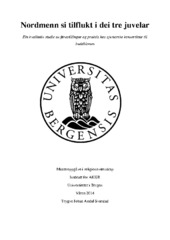| dc.contributor.author | Svarstad, Trygve Johan Andal | eng |
| dc.date.accessioned | 2014-06-12T11:42:49Z | |
| dc.date.available | 2014-06-12T11:42:49Z | |
| dc.date.issued | 2014-05-15 | eng |
| dc.date.submitted | 2014-05-15 | eng |
| dc.identifier.uri | https://hdl.handle.net/1956/7958 | |
| dc.description.abstract | Denne masteroppgåva tar føre seg korleis norske konvertittar til buddhismen tolkar og praktiserer sin nye religion. I byrjinga av dette prosjektet hadde eg to hypotesar: den fyrste er at nordmenn som har konvertert til buddhismen har detradisjonaliserte og demytologiserte tolkingar av religionen. Den andre hypotesen er at sidan dei har denne tolkinga av buddhismen vert ritual sett på som mindre viktig. For å utforske disse hypotesane nytta eg meg av kvalitativt intervju av sju norske konvertittar til buddhismen. Oppgåva har vore todelt, i fyrste delen såg eg på tolkingane til mine informantar. Her tok eg føre meg mellom anna korleis informantane mine såg på buddhisme. Såg dei på den som ein filosofi? Som ein religion? Eller som noko anna? Her undersøkte eg òg korleis dei tolka sentrale element ved buddhismen, slik som karma, reinkarnasjon og nirvana. Eg undersøkte òg deira daglege buddhistiske praksis. I denne delen tok eg òg føre meg deira bruk av ritual og korleis dei opplevde retreats. Heilt til slutt såg eg på kva dei meinte var målet med deira buddhistiske praksis. Som grunnlag i mi analyse nytta eg meg av forskingslitteratur på moderne buddhisme, då særleg har eg tatt nytte av David McMahan og hans bok The Making of Buddhist Modernism. | en_US |
| dc.description.abstract | This thesis seeks to explore how Norwegian converts to Buddhism interpret and practice their new religion. In the beginning of this project I had two hypotheses: 1) Norwegian converts to Buddhism have a detraditionalized and demythologized view of Buddhism and 2) since they interpret Buddhism in this way, rituals are de-emphasized. To examine these hypotheses I gathered information on several carefully selected issues from seven converts to Buddhism, using qualitative research interviewing. Among these issues are interpretations of key concepts such as karma, reincarnation and nirvana, and whether my informants classify Buddhism as a religion, philosophy or something else. I also examined their daily Buddhist practices. Although rituals were not important in their everyday practice, all my informants participated in rituals when they practiced with other Buddhists. I also explored how my informants use retreats. I found that they use retreats not only as an opportunity to deepen their practice, however also as an environment in which they can meet likeminded. The retreats are important as this give them a rare opportunity to meet up with other Buddhists, which can be a challenge in a small country such as Norway. Finally I asked my informants what they saw as the goal of Buddhist practice. I found that they all had different goals, however they all had in common that it was a goal that was to take place in this life, not the next. Somewhat surprising none of them mentioned enlightenment as a goal. As the base of my analysis I have used David McMahan's theories about detraditionalization and demythologization, which he presents in his book The Making of Buddhist Modernism. | en_US |
| dc.format.extent | 964697 bytes | eng |
| dc.format.mimetype | application/pdf | eng |
| dc.language.iso | nno | eng |
| dc.publisher | The University of Bergen | eng |
| dc.subject | Kulturkontakt | |
| dc.subject | Modernitet | |
| dc.subject | Religionskontakt | |
| dc.subject | Nordmenn | eng |
| dc.subject | Buddhisme | eng |
| dc.subject | Konvertitter | eng |
| dc.title | Nordmenn si tilflukt i dei tre juvelar. Ein kvalitativ studie av førestillingar og praksis hos sju norske konvertittar til buddhismen | eng |
| dc.type | Master thesis | |
| dc.rights.holder | Copyright the author. All rights reserved | |
| dc.description.degree | Master i Religionsvitenskap | |
| dc.description.localcode | MAHF-RELV | |
| dc.description.localcode | RELV350 | |
| dc.subject.nus | 714999 | eng |
| fs.subjectcode | RELV350 | |
